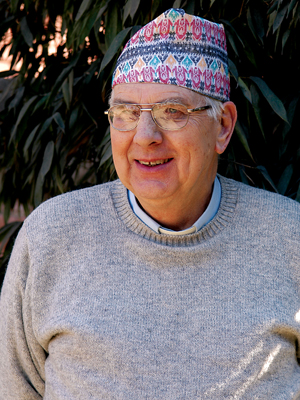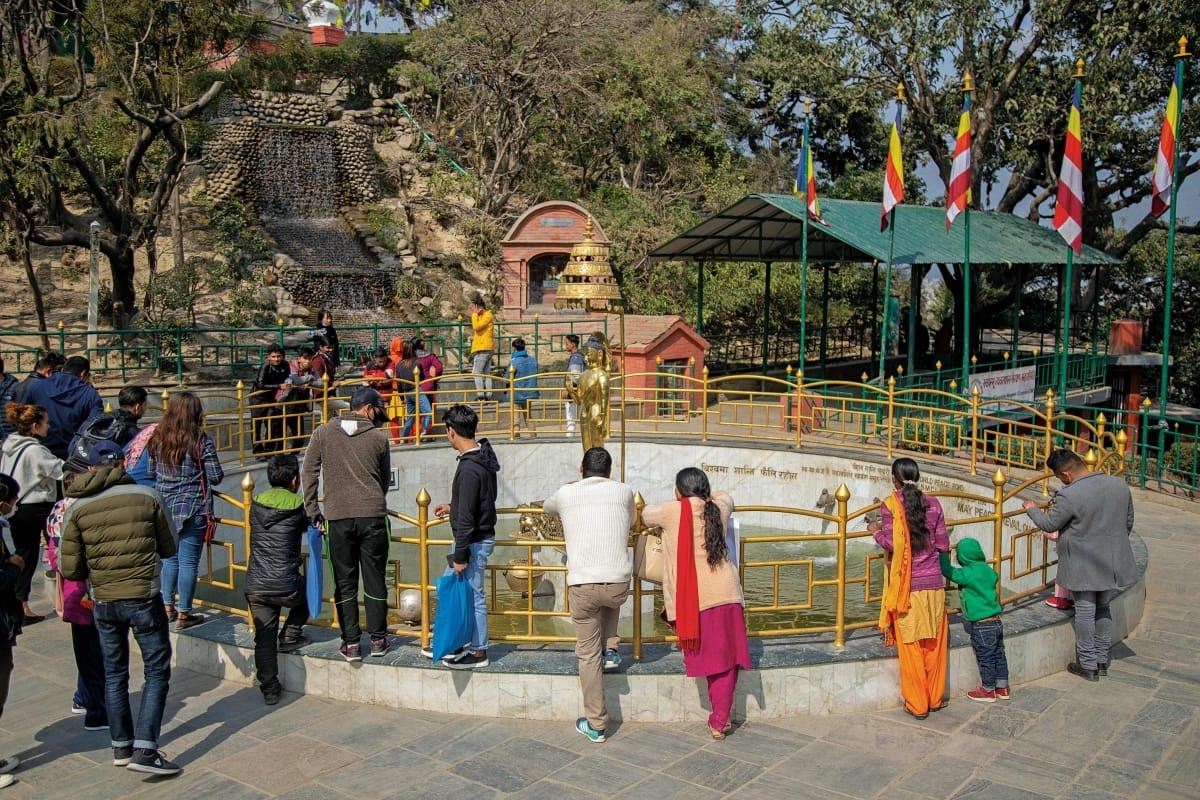It was the end of the fifties, and the whole of Kathmandu valley could boast of only two paved roads. One was New Road, and the other ran south from the Royal Palace joining New Road and connecting Singha Durbar. This was Kanti Path. Durbar Marg did not even exist. There were no buses or cars, only a few private jeeps, and Lalitpur lying across the Bagmati was totally devoid of paved roads. There were no restaurants except at Royal Hotel, which was run by a Russian named Boris Lissanevitch. In fact, the local people did not eat out, and almost the entire population walked as there were no bicycles either. It was such a scenario that confronted a 25 year old Jesuit priest as he first landed in the capital of Nepal in the fall of 1958. Having just arrived from the bustling city of Chicago in the USA, Fr. John Locke felt as if he had been transported to an earlier century.
 Fr. Locke remembers flying into Nepal from Patna in one of those Dakotas. It was an Indian airliner but not Indian Airlines. As he landed in the valley for the first time, he found the air crystal clear on that November day, and he was able to count the trees lining the distant mountains that surround the valley. The general lifestyle in the valley was primitive, but from the time he arrived, the priest has found the Nepali people open and receptive.
Fr. Locke remembers flying into Nepal from Patna in one of those Dakotas. It was an Indian airliner but not Indian Airlines. As he landed in the valley for the first time, he found the air crystal clear on that November day, and he was able to count the trees lining the distant mountains that surround the valley. The general lifestyle in the valley was primitive, but from the time he arrived, the priest has found the Nepali people open and receptive.
Having been posted at St Xavier's School, Fr. Locke took up residence at Godavari as a teacher. The school had been established only seven years before his arrival, by Fr.Marshall Moran. After teaching there for three years, he left for St Mary's in Kurseong to study theology, which he completed in 1964 and was ordained in March of that year. He then moved to Sitagarha, India where he completed his last year of training. On his return to
Kathmandu, he was appointed vice-principal at St. Xavier's where he went on to become principal, a post he held until 1969, after which he continued to teach in the school until 1981. He taught Nepali history as well as Nepali grammar. An American priest teaching Nepali grammar? He remembers that his students were rather weak in spelling. He elaborates, "There was no system. I noticed in Darjeeling, they had a system for spelling, but here they did not have one. And Nepali spelling is so much easier than English."
John Kerr Locke was born in Chicago on 18th January 1933. He and his sister were the only two children their parents had, and when John was only seven, they tragically lost their mother. He then moved in with his uncle and aunt in Iowa and spent his childhood there. But he eventually returned to Chicago to attend college. His mother was a strong Catholic, and had a lasting influence on his faith although she was a convert from the Methodist faith. During his student days at Loyola University of Chicago, John came across some Jesuits who truly inspired him. He was greatly impressed by their openness, the work they were doing and their steadfast dedication. Consequently, on 1st September 1951, he joined the Society of Jesus in Milford, Ohio. He completed a four-year training course in Ohio and spent another three years, training in Indiana. During this training period, he continued his studies and got his Litt. B. from Xavier's University, Cincinnati in 1955. He then completed his MA in Eng. Literature from Loyola University, Chicago in 1958 and also did his Ph. L from West Baden College (of Loyola Univ.) the same year. Later in the year, he moved to Nepal, the kingdom in the Himalaya that would become his second home.
Reminiscing on the early days at Godavari, Fr Locke remembers how a majority of their students came from Rana and other affluent families. But over time, more and more Newar people began sending their children to St Xavier's. At the time, there was little for these children to do at home and their parents kept them strictly indoors. Naturally, they loved to come back to school from their holidays. They enjoyed the lively boarding school atmosphere. But Fr. Locke remarks, "A child is better off at home. A boarding school is not the best way to raise a child." He also remembers one of his old students telling him, "We were not trained to live in Nepal." Life outside the school was quite different. It was a time when much of the city was still farmland, with paddy fields dominating the landscape. He talks fondly of the days when Thamel was a village, and they would walk through the fields there. It was a peaceful, quiet city with pristine air and wide open spaces that Fr. Locke came to.
Asked about outstanding personalities of the '50s and early '60s, Fr Locke remembers Boris of Royal Hotel as a wonderful man and a great character, but a bad businessman. The hotel was a meeting place for diplomats, tourists, mountaineers and the elite of Nepali society. He talks of the days when Keshar (Kaisar) Shumsher Rana had four grandchildren studying in St. Xavier's. He recalls how Keshar Shumsher would come to pay their fees and would place a stack of mohars on the table for each child. Fr Locke remembers him as a man of wide interests and one with the ability to remember who had borrowed what book from his huge collection. The general would hound any man who failed to return a book until it was put safely back in its rightful place in his extraordinary library. Even today, Kaiser Library is said to contain 30,000 books.
During his early years, John Locke's hobbies were music and photography. At school he had tried various musical instruments but never stuck to one permanently. However, he gained recognition as a choir member in the famous Paulist Choir group during his primary school days. He continued this career in another choir group when he reached high school and he finally directed the parish choir at St. Mary's Kurseong.
Fr. Locke is today considered an authority on Newar Buddhism. His interest in Buddhism started accidentally on discovering that Rato Machhendranath was actually a Buddhist deity. He also soon found out that no research had been done on Newar Buddhism. Thus began his long association with Buddhism when he started research on the 'Bhotojatra' which is a part of the Rato Machhendranath festival. While still teaching at St. Xavier's, he went on to survey the Bahals and Bahis of Kathmandu valley, which took him ten years to complete. His research led to numerous articles for various publications and three books entitled, "Rato Matsyendranath of Patan and Bungamati" Historical Series No.5. Institute for Nepal and Asian Studies, 1973; "Karunamaya" The Cult of Avalokitesvara-Matsyendranath in the Valley of Nepal, Kathmandu: Sahayogi/CNAS. and "Buddhist Monasteries of Nepal," A Survey of the Bahas and Bahis of the Kathmandu valley, Kathmandu: Sahayogi Press Pvt Ltd.
After leaving St Xavier's school, Fr. Locke has held various positions such as director and superior of Human Resources Development Research Center (HRD), Kathmandu. He has also been visiting professor (Buddhism) at Vidyajyoti, College of Theology, Delhi since 1985. He held the post of executive secretary at OTC (Office of Theological Concerns) FABC (Federation of Asian Bishops Conferences) 1997-2003. He is a visiting professor at Tribhuvan University. He has been giving talk programs for organizations like Lions Club. He is frequently called upon to give lectures on Nepali history and culture to foreign students and has even led cultural tours. But the current crisis has resulted in less foreign student coming to Nepal. At present he has taken on the job of a treasurer which calls for a load of administrative work that keeps him very busy.
Fr Locke became a Nepali citizen in 1976 and says, "In those days it was a pretty straight forward affair, but nowadays it is not easy to get a citizenship." Having lived in Nepal for forty-seven years, he remarks, "Kathmandu valley has moved 200 years within a span of forty-seven years." When asked about the status of education in Nepal, he opines, "The Maoist students want to set a limit on school fees, but they should look at the facilities that the school provides. You can't set a limit without proper knowledge of what the school provides. Some of the private schools are doing a tremendous job in educating the kids. There are some very good schools, but there are also businesses." He feels that people in local areas should take charge, and take the responsibility to build good schools, because parents are willing to pay for good facilities.
During the last four decades, Fr. Locke has witnessed a constant stream of people moving into the valley from outside. These people had nuclear families, he observed. But the valley Newars had joint families and even the business community lived simple lives. He talks of how times have changed, "The joint families are breaking up. People are moving out and the old communities have broken up. When land prices went up, people sold their communal land and as economic disparities arose, family members began to live separately."
Watching Fr. Locke walk down the corridors of HRD, one cannot help but marvel at his fitness. At 72, he has the gait of a 40 year old and a friendly, infectious smile. When asked if he is still researching, he says, "I'm too busy," and adds with that familiar smile, "Besides, I'm a bit old for all that." As a final word before parting, Fr. Locke concludes with grave concern, "Since democracy, people have found freedom of expression, but it also exposed splits among different ethnic groups. We have to do something to bring people together again."
Fr. John Locke knows Nepal better than many of us. After all he has lived here since the fifties and taught Nepali grammar and history. Although a Jesuit priest, he knows more about Buddhism than most of us. It is no wonder then, that they do not call him a treasurer. They call him a 'treasure'.










